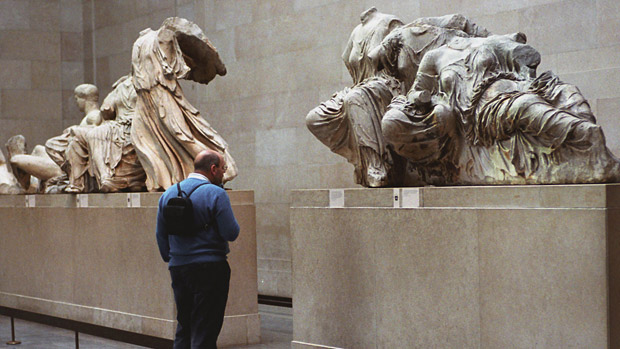Elgin Marbles loaned to Russia: should they be back in Greece?
Loan of priceless river god Ilissos is likely to reignite long-running Elgin Marbles dispute between London and Athens

A free daily email with the biggest news stories of the day – and the best features from TheWeek.com
You are now subscribed
Your newsletter sign-up was successful
The British Museum has loaned one of the Elgin Marbles to Russia – the first time part of the priceless collection has been moved out of Britain since it arrived from Greece. The loan comes amid fears of a new Cold War with Moscow, but is also likely to reignite the long-running cultural heritage dispute between London and Athens.
What are the Elgin Marbles?
The term is most commonly used to refer to a collection of sculptures, inscriptions and architectural features acquired by Lord Elgin, the British ambassador to the Ottoman Empire, in Athens between 1801 and 1805. The collection includes objects from the Parthenon and other buildings on the Acropolis, including the Erechtheion, the Propylaia and the Temple of Athena Nike. The British Parliament bought the collection from Lord Elgin in 1816 and presented it to the British Museum, where it has remained until today.
The Week
Escape your echo chamber. Get the facts behind the news, plus analysis from multiple perspectives.

Sign up for The Week's Free Newsletters
From our morning news briefing to a weekly Good News Newsletter, get the best of The Week delivered directly to your inbox.
From our morning news briefing to a weekly Good News Newsletter, get the best of The Week delivered directly to your inbox.
Why are they in the news?
The British Museum has loaned one of the sculptures – a headless depiction of the river god Ilissos – to a Russian museum in St Petersburg. The figure will go on public display at St Petersburg's State Hermitage Museum until 18 January.
Why is this significant?
The fact that Ilissos has gone to a Russian museum is controversial in itself given the frosty relationship between Russia and the West. Moscow is accused of engineering violence in Ukraine and supplying Ukrainian rebels with weapons used to shoot down Malaysia Airlines flight MH17 in July, killing all 298 people on board. President Vladimir Putin, who denies the claims, yesterday implied that the West was seeking to build a "new Iron Curtain" around Russia, stoking fears of a new Cold War. However, Neil MacGregor, director of the British Museum, says that the "more chilly the politics between governments the more important the relationship between museums". On top of this, the loan of Ilissos is likely trigger renewed calls for the Elgin Marbles to be returned to Greece.
A free daily email with the biggest news stories of the day – and the best features from TheWeek.com
Why should the Elgin Marbles be returned to Greece?
The Greek government has long argued that the 2,500-year-old sculptures were obtained illegally while the country was under Turkish occupation. It refuses to recognise the British Museum's ownership of the sculptures and wants them returned. Britain claims Lord Elgin bought the statues legally from the Ottoman Empire before Greece won its independence and that in so doing he saved the works from damage. It says that returning them would set a worrying precedent for all the major museums in the world and has previously claimed that the artwork would be better looked after in London. The latter point has become harder to argue over the years: the marbles have suffered considerable damage during extraction and while in London, while Greece has been restoring the Acropolis since 1975 – and creating the facilities to look after the sculptures.
What's Hollywood got to do with it?
The Elgin Marbles have been a battleground for artists and performers since the days of Melina Mercouri, the actress-turned-Greek-culture-minister who campaigned for their return in the 1980s, says The Times. George Clooney, Bill Murray, Stephen Fry and Matt Damon are among those who have backed Athens' appeal. Clooney's wife Amal, a human rights lawyer, has also been approached to represent the Greek government in calling for the collection's return.
-
 Can foster care overhaul stop ‘exodus’ of carers?
Can foster care overhaul stop ‘exodus’ of carers?Today’s Big Question Government announces plans to modernise ‘broken’ system and recruit more carers, but fostering remains unevenly paid and highly stressful
-
 6 exquisite homes with vast acreage
6 exquisite homes with vast acreageFeature Featuring an off-the-grid contemporary home in New Mexico and lakefront farmhouse in Massachusetts
-
 Film reviews: ‘Wuthering Heights,’ ‘Good Luck, Have Fun, Don’t Die,’ and ‘Sirat’
Film reviews: ‘Wuthering Heights,’ ‘Good Luck, Have Fun, Don’t Die,’ and ‘Sirat’Feature An inconvenient love torments a would-be couple, a gonzo time traveler seeks to save humanity from AI, and a father’s desperate search goes deeply sideways